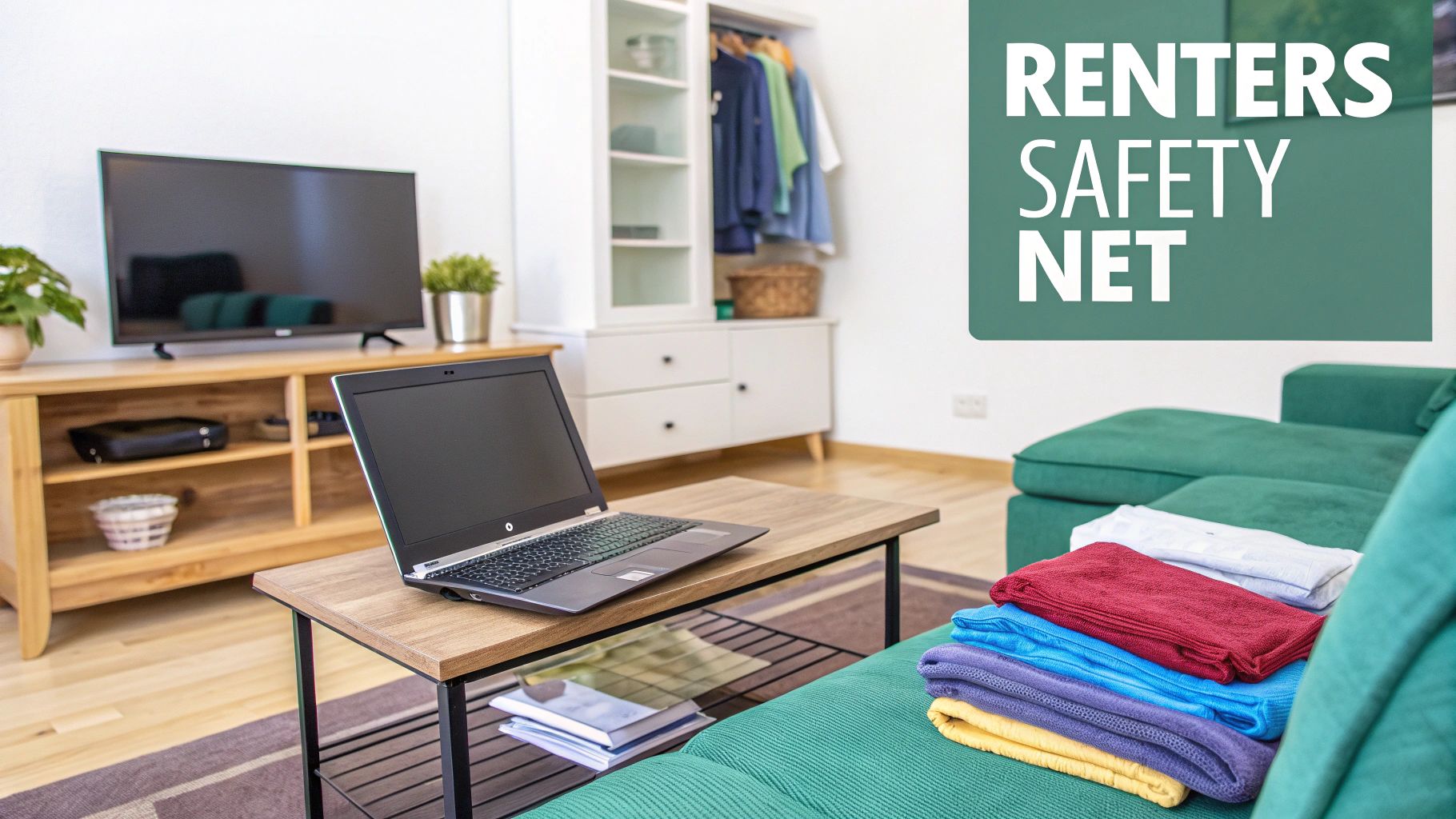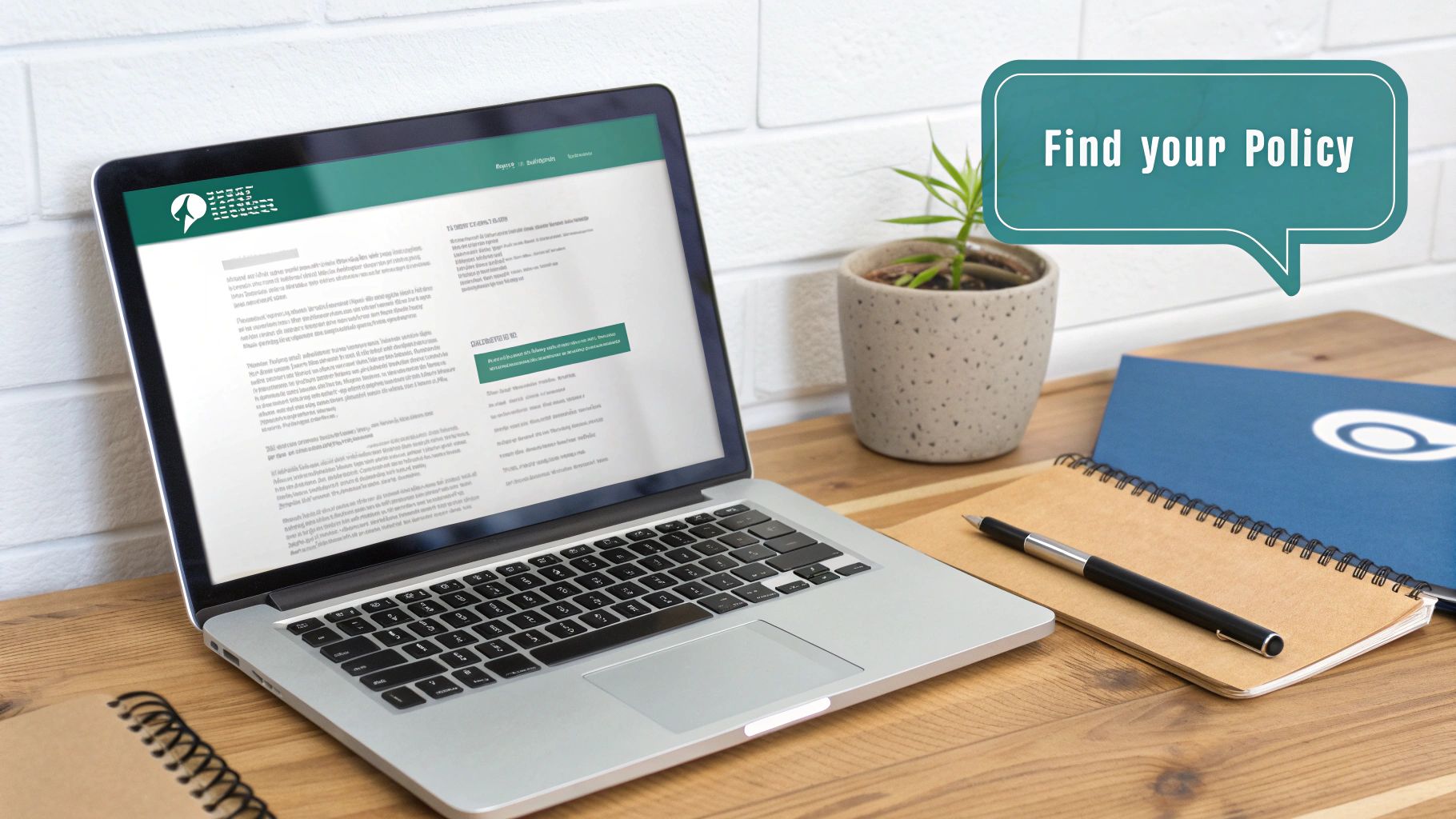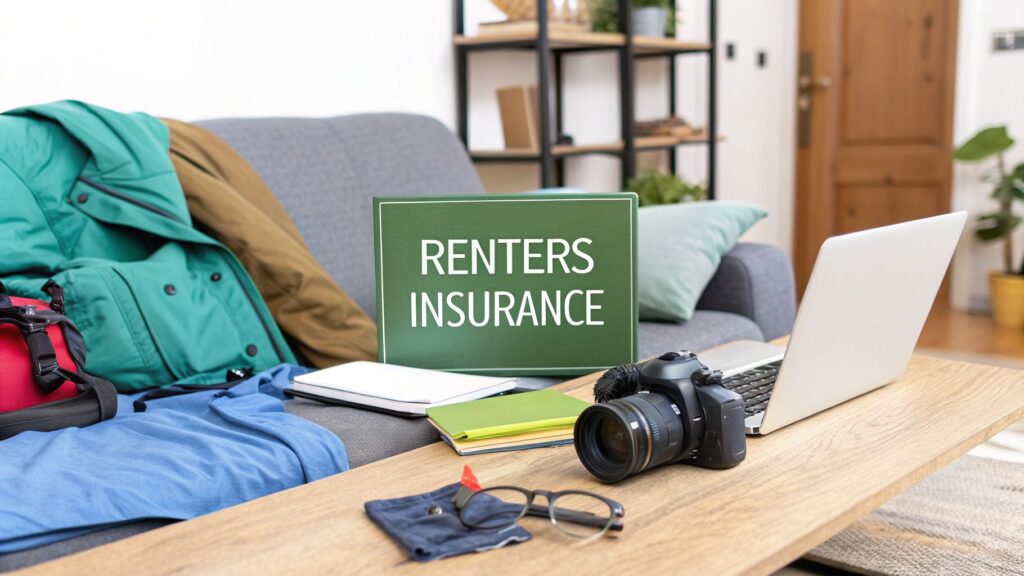Think of renters insurance as a personal financial safety net for everything you own inside your apartment or rented home. It’s a common misconception that your landlord’s insurance policy has you covered.
It doesn’t. Their policy only covers the building itself—the walls, the roof, the floors. Your policy, on the other hand, is all about protecting your personal belongings from unexpected events like theft, fire, or certain types of water damage.
Your Financial Safety Net as a Renter

It’s a tough lesson to learn, but the responsibility for your stuff falls squarely on your shoulders. Without renters insurance, if a pipe bursts or a fire breaks out, you’d be on the hook for replacing everything from your laptop and couch to your entire wardrobe. That’s a massive, unexpected expense no one wants to face.
This is where that simple, affordable policy becomes a financial lifesaver. It’s designed to protect you in three key ways:
- Personal Property: This is the core of the policy. It helps you repair or replace your belongings if they are stolen or damaged by a covered event.
- Liability Protection: What if a guest trips and gets hurt in your apartment? This coverage helps pay for their medical bills or your legal fees if you’re found responsible.
- Additional Living Expenses: If your place becomes uninhabitable due to something like a fire, this coverage kicks in to pay for temporary housing, like a hotel, so you aren’t left stranded.
It’s easy to overlook, but renters insurance is a huge part of the property insurance landscape. In fact, the market is projected to be worth around USD 38.28 billion by 2025. It provides a layer of security that goes far beyond the money you put down to move in.
While a security deposit is there to protect the landlord from damages, renters insurance is all about protecting you and your financial well-being. It’s the simple step that ensures one bad day doesn’t completely derail your future.
Renters vs. Landlord Insurance: A Quick Comparison
To clear up any confusion, it’s helpful to see a side-by-side breakdown of who covers what.
| Coverage Area | Covered by Renters Insurance | Covered by Landlord Insurance |
|---|---|---|
| Your Belongings | ✅ Yes (furniture, electronics, etc.) | ❌ No |
| Structural Damage to the Building | ❌ No | ✅ Yes (roof, walls, foundation) |
| Liability for Guest Injuries | ✅ Yes (inside your unit) | ✅ Yes (in common areas) |
| Temporary Living Expenses | ✅ Yes (if your unit is unlivable) | ❌ No |
| Building's Appliances | ❌ No | ✅ Yes (if provided by landlord) |
As you can see, the two policies are designed to work together, not overlap. Each protects a different set of financial interests, making both essential for a secure rental situation.
What Renters Insurance Actually Covers: The Big Three
Think of a solid renters insurance policy like a three-legged stool. It gives you a stable financial foundation when things go sideways. Each leg represents a core type of coverage, and if one is missing, that whole foundation gets pretty shaky. All three work in tandem to protect you from different kinds of unexpected, and often expensive, situations.
Let's break down what those three pillars really are.

As you can see, a complete policy is built on Personal Property, Liability, and Additional Living Expenses. Each one tackles a completely different kind of financial risk you face as a renter.
Personal Property Coverage: Protecting Your Stuff
This is the one most people think of first. Personal Property Coverage is all about repairing or replacing your belongings if they get damaged or stolen. We're talking about covered events like a fire, a break-in, or even a burst pipe from the apartment upstairs. It protects everything you own—from the big-ticket items like your TV and couch to the smaller stuff like your clothes and kitchen gadgets.
Picture this: a fire in your building's faulty wiring damages your unit. Your landlord’s insurance will fix the walls and floors, sure, but what about your smoke-damaged furniture and fried laptop? That’s where your renters policy swoops in to cover the cost of replacing your things. Without it, you'd be starting from scratch on your own dime. A great first step in preparing for this is to document what you own using a detailed apartment move-in inspection checklist, which can easily serve as a basic inventory list.
Pro Tip: Your personal property coverage usually travels with you. If someone snags your laptop from a coffee shop or your bike from a rack downtown, your renters insurance can still help cover the loss.
Liability Coverage: Your Financial Shield
The second leg of the stool is Liability Coverage, and honestly, it might be the most crucial protection you never realized you needed. It’s designed to protect you financially if you’re found responsible for accidentally injuring someone or damaging their property.
Let's say a friend comes over, slips on a wet spot on your kitchen floor, and breaks their wrist. Your liability coverage can step in to help pay for their medical bills. It can even cover your legal fees if that friend decides to sue. A simple accident can turn into a lawsuit that wipes out your savings, but liability coverage acts as a buffer. It also covers you if you accidentally damage someone else’s property, like if you forget to turn off the sink and flood the apartment below you.
Additional Living Expenses: Your Lifeline When You’re Displaced
The final pillar is Additional Living Expenses (ALE), sometimes called "loss of use" coverage. This is your safety net if your apartment becomes unlivable because of a covered disaster, like a serious fire or major hurricane damage. You can't live there, but you still have to pay rent. Now what?
ALE helps cover the extra costs you rack up while your home is being repaired. This could include things like:
- The cost of a hotel or a short-term rental
- Extra money for restaurant meals since you don't have a kitchen
- Fees for using a laundromat if your washer/dryer is inaccessible
This coverage is a true lifesaver. It keeps you from having to pay for your rent and a hotel at the same time, giving you some much-needed stability during a completely chaotic period so you can keep your life on track.
How Renters Insurance Costs Are Determined
One of the best things about renters insurance is how surprisingly affordable it can be. We’re often talking about a price tag that’s less than your monthly streaming bill. So, what exactly goes into calculating that final number? Insurers look at a handful of key factors to figure out your premium.
It all starts with how much coverage you actually need. If your personal belongings are worth more, you'll need a higher coverage limit, which nudges the price up. Someone with $15,000 in furniture and gadgets will naturally pay less than a neighbor who needs $40,000 of protection. The same logic applies to your liability coverage limit.
Key Factors Influencing Your Premium
Where you live matters a lot. If your apartment is in an area with a higher risk of break-ins or is more exposed to severe weather—like some coastal spots in Boca Raton—your rate might be a touch higher. Insurance companies lean heavily on claim data from specific zip codes to gauge this risk.
Your deductible also plays a huge role in your monthly cost. This is the amount you agree to pay out-of-pocket on a claim before your insurance policy starts paying.
Think of it this way: a higher deductible, say $1,000, means you're taking on more of the initial financial risk. In return, the insurance company gives you a lower premium. Opting for a lower $250 deductible means less out of your pocket during a claim, but you’ll pay a bit more each month for that convenience.
Actual Cash Value vs. Replacement Cost
Finally, you’ll have a big decision to make: do you want an Actual Cash Value (ACV) or a Replacement Cost Value (RCV) policy? This choice determines how you get paid after a loss.
An ACV policy pays you for what your stuff was worth the moment it was damaged or stolen, which includes depreciation. It’s basically the "garage sale price" for your five-year-old laptop.
RCV, on the other hand, gives you the money to buy a brand-new, similar item. An RCV policy costs a little more upfront, but it offers true peace of mind, ensuring you can actually replace what you lost without draining your savings. This preference for better coverage is a big reason the renters insurance market is projected to hit $5.9 billion by 2025. You can explore more about these market trends and their implications for consumers.
Why Renters Insurance Is a Non-Negotiable Asset
It's tempting to think of renters insurance as just another bill, maybe an optional one you can skip to save a few bucks. But that's a huge mistake. This isn't just about covering your TV if someone steals it; it's a financial safety net that protects your entire life from a single, unlucky day.
Let’s get real for a second. Imagine your apartment building has a fire tonight. Could you, right now, afford to replace everything you own? Your couch, your bed, every shirt and pair of shoes, your laptop, your kitchen supplies… all of it. For most of us, that's a financially crippling thought.
Protecting More Than Just Your Stuff
Here's what many people miss: renters insurance goes way beyond your personal belongings. The liability coverage is arguably the most critical part. What if a friend slips on a wet floor in your kitchen and breaks their leg? You could be on the hook for their medical bills and even face a lawsuit. That's a nightmare scenario that could derail your financial future for years. Liability coverage is designed to step in and handle those costs.
Renters insurance is the difference between a major, stressful inconvenience and a full-blown financial catastrophe. It gives you the breathing room to get back on your feet without having to start over from zero.
A Growing Financial Safeguard
It seems more and more people are catching on to this. The global renters insurance market was valued at around USD 5.12 billion in 2023 and is only expected to get bigger. You can learn more about renters insurance market trends to see just how many renters are making this a priority.
That small monthly premium is an investment in your stability and peace of mind. And while you're at it, exploring general home insurance options can give you an even better picture of property protection. At the end of the day, it's all about making sure one bad day doesn’t wipe out years of your hard work.
Finding the Right Renters Policy for You

Alright, let's talk about picking the right renters insurance. It's not nearly as intimidating as it sounds. With a solid game plan, you can find a policy that truly fits your life here in Boca Raton without breaking the bank. The single most important place to start? Figuring out exactly how much coverage you actually need.
Start With a Home Inventory
Before you even think about getting quotes, you need to get a handle on what your stuff is worth. This is where a home inventory comes in. Don't let the term fool you; it's just a simple list of your belongings and what it would cost to replace them.
You don't need a fancy spreadsheet. Just walk through your apartment with your phone, taking a quick video or snapping photos. Jot down the big-ticket items as you go:
- Electronics: Your laptop, TV, sound system, and any gaming consoles.
- Furniture: The sofa, bed frame, mattress, dining table—it all adds up.
- Appliances: That nice microwave or the air fryer you use every day.
- Clothing & Jewelry: Don't forget your wardrobe, especially any valuable pieces.
Taking a few minutes to do this now prevents a ton of guesswork later and ensures you don't accidentally underinsure yourself. Plus, if you ever do have to file a claim, this list will be your best friend.
Compare Quotes and Save
Once you have that magic number—your total personal property value—it's time to shop around. Please don't just take the first quote you see! Your goal should be to compare offers from at least three different insurance companies, and look at more than just the monthly premium.
A cheap policy isn't always the best policy. Pay close attention to coverage limits, deductibles, and customer service reviews to understand the true value you’re getting.
Always ask about ways to save. Most companies will give you a nice discount for bundling your renters and auto insurance. You can also often snag a lower rate for having safety devices like smoke detectors or a burglar alarm in your apartment. Getting smart about your policy is just as crucial as understanding your rental contract; check out our smart tips for navigating apartment lease agreements to make sure you're covered on all fronts.
If you're in the middle of a big move, getting your renters insurance sorted out should be high on your to-do list. Using a comprehensive interstate moving checklist can be a lifesaver to make sure you don’t let this critical detail slip through the cracks.
Frequently Asked Questions About Renters Insurance
Even after you get the hang of what renters insurance is, a few questions almost always come up. It's smart to get these cleared up before you commit to a policy, just so you know exactly what you’re signing up for. Let's walk through some of the most common things renters wonder about.
One of the first questions is usually, "Am I legally required to have this?" The short answer is no; there isn't a state or federal law forcing you to buy renters insurance. But—and this is a big but—your landlord can absolutely require it as part of your lease. They're not just being difficult; they're protecting their property from potential damage you might cause.
Real-World Coverage Scenarios
What about roommates? This is a huge point of confusion. Never, ever assume your roommate's policy covers your stuff. It almost certainly doesn't. Insurance policies cover people, not the apartment itself, so you'll need your own policy to protect your belongings and cover your liability.
Then there's the deductible. The easiest way to think about it is as your share of the repair or replacement cost. Let's say your $1,500 laptop gets stolen and your policy has a $500 deductible. You'd pay the first $500, and your insurance would cover the remaining $1,000.
A higher deductible usually means a lower monthly payment, but it also means you'll pay more upfront if you need to file a claim. It's all about finding that sweet spot between what you can afford each month and what you could comfortably pay in an emergency.
Finally, you need to be crystal clear on what isn't covered. Standard renters policies almost never cover damage from floods or earthquakes. If you live somewhere prone to these events, you’ll need to buy separate, specialized policies for that kind of protection. Always read the exclusions section of your policy so there are no surprises down the road.
At Cynthia Gardens, we want our residents to feel confident and informed. If you're looking for a peaceful, well-cared-for apartment in Boca Raton where your peace of mind is a priority, we'd love to show you around. Find your perfect apartment at Cynthia Gardens today!
